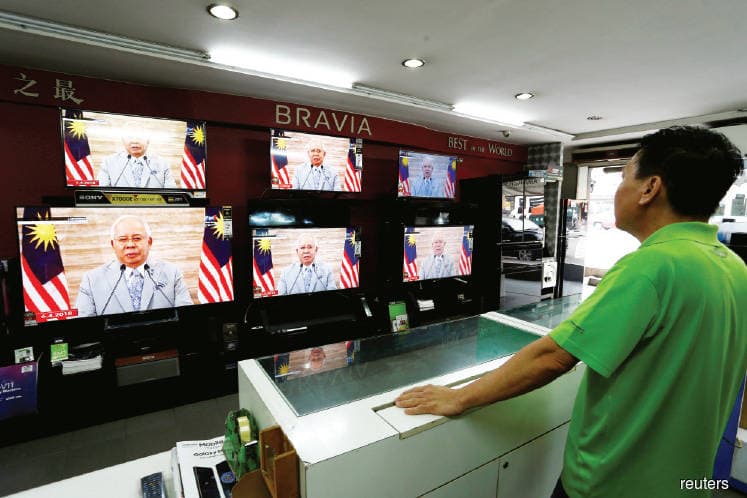
This article first appeared in The Edge Financial Daily on April 10, 2018
KUALA LUMPUR: I’m not into manifestos. No matter which party draws one up. But as a reporter covering elections, I have no choice but to, or should I say, take a look at them.
A manifesto, as Wikipedia describes it, is a published verbal declaration of the intentions, motives or views of the issuer, be it an individual, group, political party or government.
A manifesto as I know it in my line of duty is one drawn up by political parties whose objective is to win the hearts and minds of the people. That would mean to reap votes to win during elections.
Over the years, we have seen many manifestos. More often than not, these manifestos outlined policies to be implemented for the good of the nation when or if the party proclaiming it comes to power.
Of late, we have different manifestos by the same party, especially designed, so to speak, to cater to the needs of certain groups of people or states.
Hence, we have a manifesto for the nation and manifestos for states by the same party.
Take Barisan Nasional’s (BN) manifesto for the coming 14th general election. On Saturday Prime Minister Datuk Seri Najib Razak unveiled the coalition’s manifesto for Malaysia. At the same time, BN has manifestos for Selangor and Kelantan. I’m sure other manifestos for other states are in store.
Now, we even see BN’s senior coalition partner, MCA, having a special manifesto for the Chinese community.
This I simply can’t understand — despite being told the manifestos are meant to deal with the different needs of different people in different areas. I get it, but I don’t agree. Why can’t they have a common manifesto for all Malaysians?
It’s bad enough that voters are “segregated”, according to race by, the recent Election Commission redelineation exercise. Now, we have manifestos doing the “segregation”.
Manifestos of BN and Pakatan Harapan are pledging financial aid for the rakyat, in particular the poor among us. That’s well and good. The poor deserve all the help they can get.
True, both manifestos boast of policies that are deemed to be for the good for all. But cash handouts are featured prominently, with BN “winning” as far as cash handout pledges go.
Little wonder that BN supporters in “explaining” their manifesto gleefully point to the announcement made by Najib on the doubled 1Malaysia People’s Aid payments, saying “that is the best thing about our manifesto”.
Little wonder also that some people are calling it a “moneyfesto”.
As Najib’s announcement was carried “live” on national television and was covered extensively by the media, I see no reason for me to repeat what has been reported.
But for folks who insist on knowing the details and breakdown, I humbly suggest you to Google it.
Which begs the question — Can BN afford it?
Yes, according to Najib’s second-in-command, Deputy Prime Minister Datuk Seri Dr Ahmad Zahid Hamidi. He said the manifesto took into consideration the national coffers, especially sovereign wealth fund Khazanah Nasional Bhd.
He went on to say the BN manifesto “showed that the country has strong financial reserves and is not bankrupt”.
Still, such a reassurance has not allayed concerns of at least some of our fellow citizens. A veteran financial journalist commented that he’s worried about the impact it could have on the nation.
Talking of manifestos brings me back to 2013.
A group of women of the Selangor Single Mothers Association took the state government and the then menteri besar Tan Sri Khalid Ibrahim to court for “reneging on the promise of giving allowances to single mothers in the state”.
Apparently, the promise was in the Khalid administration’s manifesto in the 2008 general election.
The case went right up to the Court of Appeal, which ruled that an election manifesto is not legally enforceable.
Justice Hishamudin Yunus agreed with Khalid’s lawyers that the manifesto “was not a legally binding document” and a person “aggrieved at the unfulfilment of an election manifesto cannot seek to enforce the manifesto”.
Well, that might be the case legally. But political parties have a moral obligation to the people to make good their promises and pledges as contained in their manifestos.
The Malay saying goes: “Manusia dipegang kepada janjinya (a person is held to the promises he or she makes).”
And as for Khalid, sadly he is most remembered as a politician who infamously said: “A manifesto is not a promise; as such, there is no need to fulfil it.” He is right legally, but in the words of a Pakatan Harapan supporter: “That’s why he is no more with us and helping the other side.”
Mohsin Abdullah is a contributing editor at The Edge Financial Daily. He has been covering politics for over four decades.